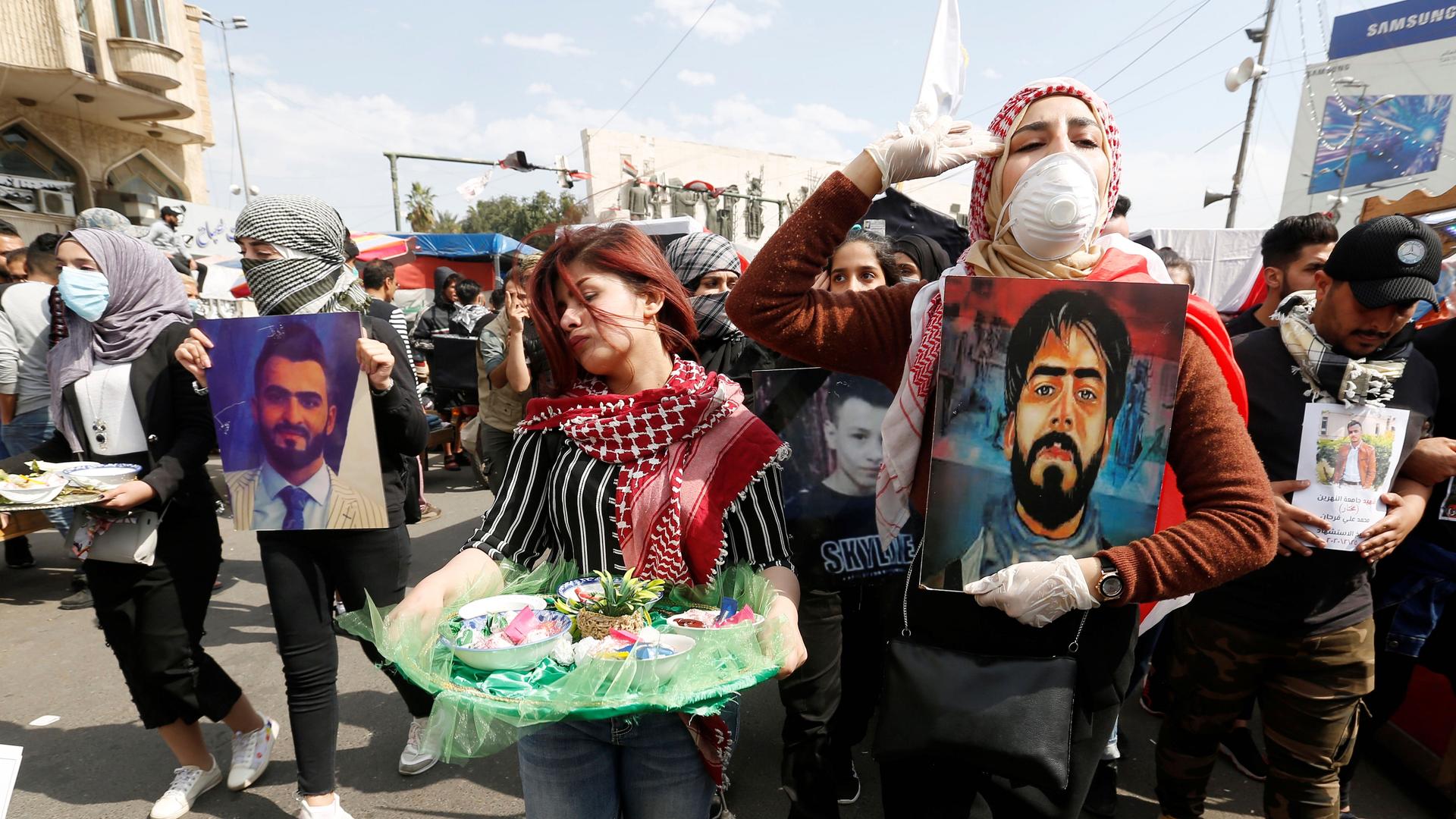Before coronavirus, young Iraqis held some of the biggest protests in the country’s history
Iraqi protesters wore face masks even before the coronavirus. Not that they predicted the pandemic — it was more to protect themselves from tear gas and to avoid detection by the security forces.
Thousands of Iraqis, mostly young, took part in the demonstrations that began last October. They were frustrated by corruption and mismanagement, high unemployment, and a lack of services.
They wanted an overhaul of the Iraqi government. Baghdad’s Tahrir Square became a focal point of the anti-government gatherings.
“I spent six months in Tahrir Square, [losing] my apartment, [losing my job, [losing] everything because I believed the change from these protesters.”
“I spent six months in Tahrir Square, [losing] my apartment, [losing my job, [losing] everything because I believed the change from these protesters,” said 21-year-old Ali Amer al-Mikdam.
Related: Economist Thomas Piketty: Pandemic exposes the ‘violence of social inequality’
Now, their public protests are on hold due to the COVID-19 outbreak. But that doesn’t mean they have backed away from their cause. Instead, some activists say they are using this time under lockdown to regroup and prepare for the many challenges ahead, after the coronavirus restrictions begin to lift.
Earlier on, Mikdam posted videos and photos of the protests in Tahrir Square on social media. In one video, he tries to speak after being tear-gassed.
“I lost a lot of friends in the protests,” he said in an interview. “A lot.”
More than 600 Iraqis died in the October protests, according to Amnesty International. The human rights organization holds government security forces responsible. Images of the violence circulating online are chilling.
Twenty-six-year-old Rasha Albani went to some of the protests in Baghdad.
Related: Libyans are caught between coronavirus and conflict
“I had one protester approach me and ask if I could publish a video he took of his friend who had been directly shot in the head with a sniper,” she said. “And he told me that it was my responsibility to publish it if I could publish it. So that the world could see what was happening. And that’s exactly what I did.”
“People kept going. There was a lot of resilience and a lot of hope, hope so infinite not even God could break [it].”
Albani, who is British Iraqi, says there was a lot of tension and fear among the protesters “but people kept going. There was a lot of resilience and a lot of hope, hope so infinite not even God could break [it].”
The high point for the protesters came in November when Prime Minister Adel Abdul Mahdi resigned. He remains the prime minister in a caretaker role, explained Steven Cook, senior fellow for Middle East and Africa studies at the Council on Foreign Relations.
“There have been two other prime minister-designates who have been unable to form a government, and now we are on to the third prime minister-designate — a gentleman named Mustafa al-Kadhimi,” Cook said.
According to Cook, Kadhimi has a tough road ahead. Besides the popular protests, he faces falling oil prices, a pandemic and the resurgence of ISIS.
Related: How coronavirus is changing the way Muslims celebrate Ramadan
Meanwhile, he says, the US, which invaded Iraq in 2003, has lost interest in Iraqi politics.
“The administration has had very little to say about the political process that’s unfolding in Baghdad and the effort to form an Iraqi government.”
“The Trump administration looks at Iraq almost exclusively as a counterterrorism issue and an arena in which to apply maximum pressure on Iran,” Cook said. “The administration has had very little to say about the political process that’s unfolding in Baghdad and the effort to form an Iraqi government.”
Foreign influence, be it from Iran or the US, has been a focal point in the protests. Many Iraqis say they’ve had enough with foreign meddling in their country.
Muhammad al-Waeli writes about Iraqi politics and lives in Baghdad. He said the country is currently under lockdown because of the coronavirus. But Iraqis are not strangers to curfews.
“We had situations where the security was very bad. People had to stay home for many weeks, actually,” he said.
So even if the streets are empty, that doesn’t mean the protests are over. For example, Mikdam, the protester, spends his days making calls with human rights groups and coordinating with his fellow protesters.
He finds this downtime helpful: “We need time to rest, so coronavirus, it’s a good time to sit and think. This time is the time of collecting, preparing to come back stronger than before after the coronavirus.”
The World is an independent newsroom. We’re not funded by billionaires; instead, we rely on readers and listeners like you. As a listener, you’re a crucial part of our team and our global community. Your support is vital to running our nonprofit newsroom, and we can’t do this work without you. Will you support The World with a gift today? Donations made between now and Dec. 31 will be matched 1:1. Thanks for investing in our work!
